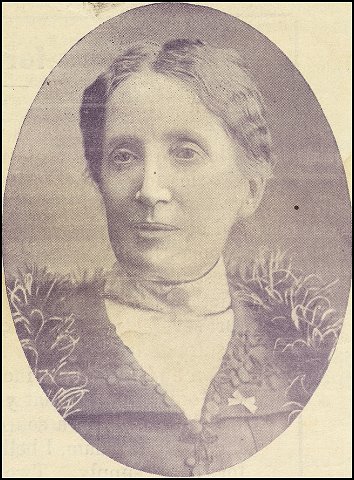(Image from the cover of the White Ribbon Signal, see below)
Prominent Tasmanian suffragist.
Tasmanian & Australian president of the W.C.T.U (Women’s Christian Temperance Union), one of major lobby groups for women’s suffrage, particularly in Tasmania, as well as social reform in general.
Australian Dictionary of Biography
Wikipedia
Department of Premier & Cabinet, Tasmania
Australian Women’s Register
The Encyclopedia of Women & Leadership in Twentieth-century Australia
DEATH OF MRS. ROOKE.
Information was received yesterday of the death of Mrs Rooke at Burnie, and notification appears in this day’s obituary column. Mrs Rooke had for years been one of the most prominent figures in philanthropic and temperance work in Australia, and was always to the fore in any involvement for the amelioration of the condition of the poor, or any reform in the drink traffic. She was for five years president of the Tasmanian branch of the Woman’s Christian Temperance Union, and for three years president of the union in Australia, and all through her recent illness was looking forward hopefully to attending the sixth triennial convention of the Australasian Woman’s Christian Temperance Union to be opened at Hobart on February 23. Mrs Rooke, who was the widow of the late Dr O Rooke, had a charming personality and endeared herself to a large circle of friends, not only in Tasmania, but all over Australia. Our Burnie correspondent wired last night that Mrs Rooke died, after a lingering illness of six months, and that she had boon unconscious for some days The following letter published in the The People’s Friend” on January 1, was probably the last she wrote for the cause she had so such at heart -“W.C.T.U. Beloved Comrades,–Let me wish you a very happy 1906, and full of loving and prosperous service for the cause we are pledged to uphold. One thing we are assured that His grace is sufficient for all our needs, and we shall be more than victors through Jesus Christ. Plans will have to be considered, and made to secure local option during this coming session, and I hope that every union and individual member will be prepared to work vigorously for the measure. To prepare the way, literature bearing on the subject should be widely circulated, and so educate public sentiment on its justice. My health is still very feeble, and I ask the continuance of your prayers. Praying God’s blessings may rest on one and all –I am, yours lovingly, Jessie S Rooke.”
The Mercury, 5 January 1906
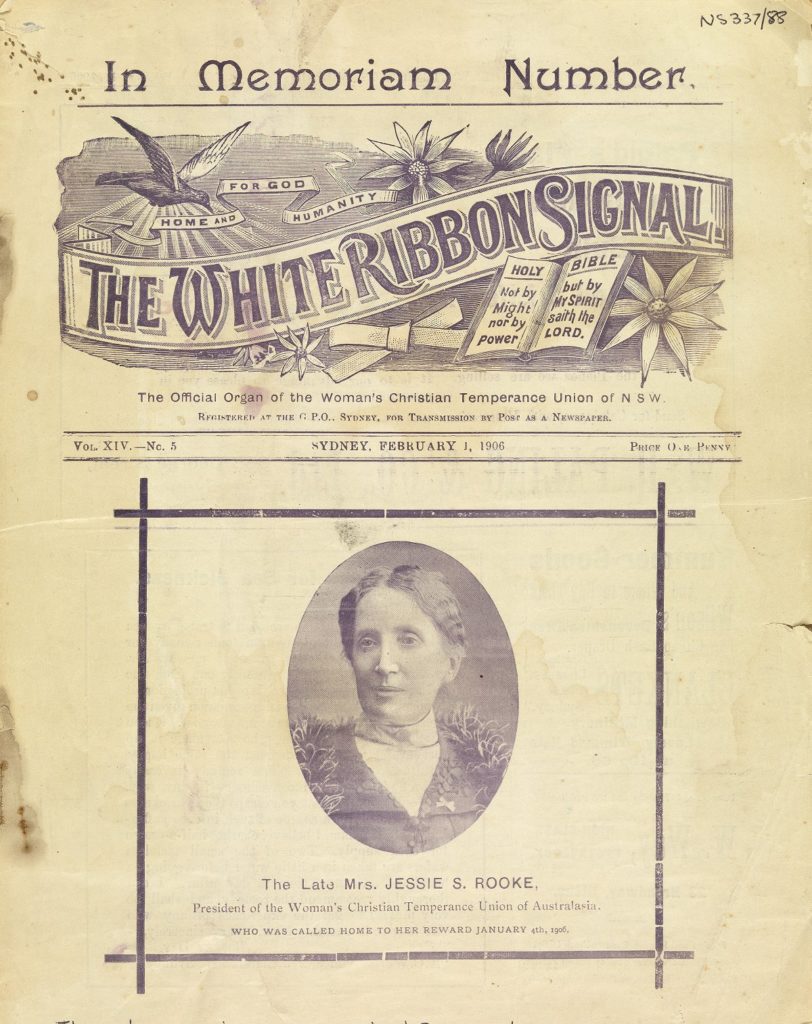
White Ribbon Signal, 1906, Memoriam for Jessie Rooke. Tasmanian Archive & Heritage Office – NS337/1/88
The demise of Mrs. Jessie Rooke will be felt with regret throughout the several states where the deceased lady, as Australasian president of the W.C.T.U., was widely known, her earnest advocacy of the principles of the union–“For God, home, and humanity” –having won many a heart to share the work of the society, more particularly in Burnie, where the deceased lady was president of the local branch. She was widely, known for her efforts to uplift humanity, and her womanly nature was ever felt in the cause of distress or charity. Mrs. Rooke took a keen interest in the welfare of the state, and in the political world her efforts were always directed towards purity and temperance. The deceased lady will be remembered by large numbers, and in the town where she had spent very many years her life will be held in remebrance with deep affection.
Examiner, 6 January 1906
——————————————————
Some bits from the Tasmanian campaign:
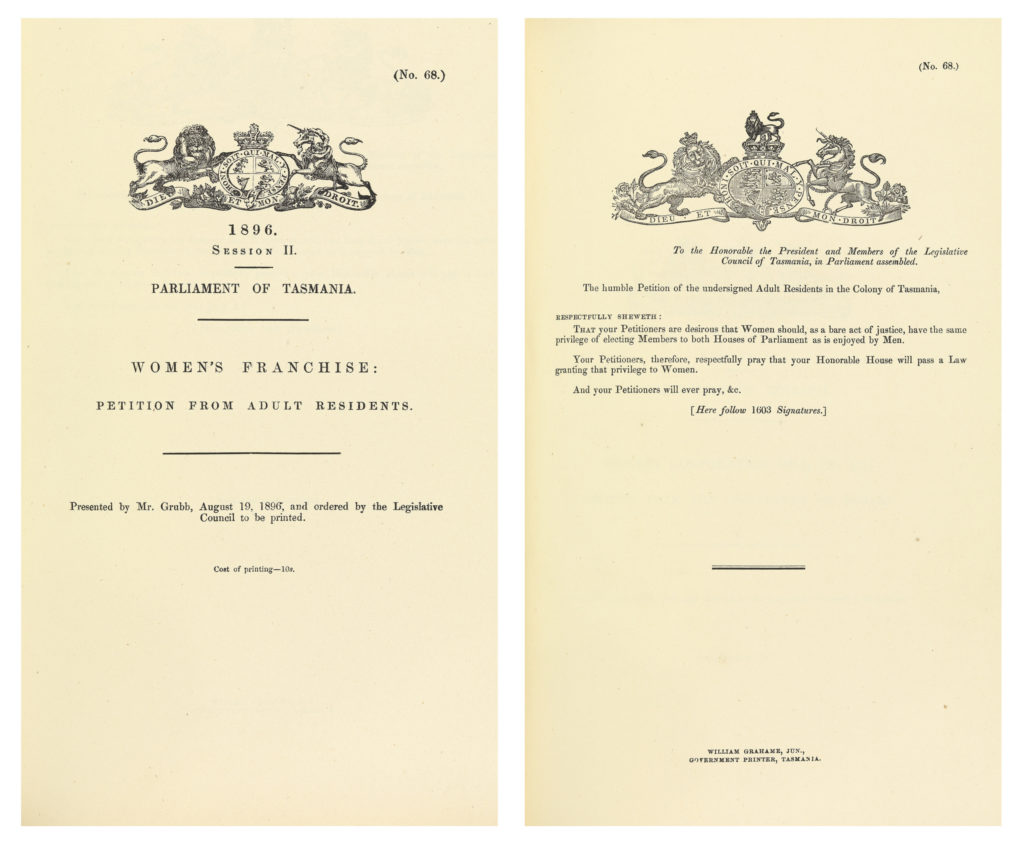
Petition presented to parliament. (Tasmanian Archive and Heritage Office, Tasmanian journals and papers of parliament 1896, paper 68)
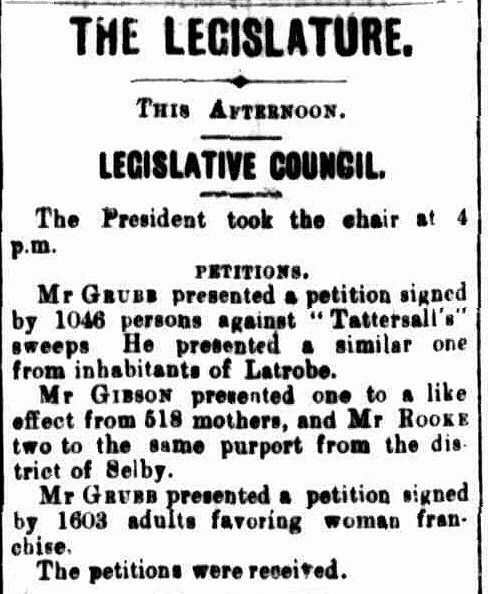
Tasmanian News, 19 August 1896
Extract from “House of Assembly”:
On clause 4 -“Qualification of electors for House of Assembly ” –
Mr McWILLIAMS moved that the word ” male ” be struck out with the object that the vote be given to both sexes who possessed the prescribed qualification. Judging from the reception which this principle received in the House last year he did not anticipate that there would be any difficulty in obtaining for it now the sanction of the committee. He believed that there was a majority of male electors in the colony in favour of the principle. The Legislative Council rejected last session the bill giving effect to the principle, not because of that provision, but on account of the clause (now omitted) giving the Governor power to dissolve the Council under certain circumstances. It was believed that there were so many women now engaged in the battle of life, side by side with men, that they ought to have a share in making the laws which governed them. Women also possessed a special interest in legislation affecting the young, and it was believed that altogether women would give a healthier tone to politics, and have an influence upon public affairs of an elevating and purifying character.
The PREMIER (Sir Edward Braddon) hoped the committee would not suffer itself to be carried into dangerous paths. He would point out that even if women obtained the suffrage under this bill they could not vote at the next general election, and even if that were not so it was wise the House should consult the wishes of the country and know what they were.
A MEMBER : That has already been done.
The PREMIER : At one place, Evandale, where a lady of enormous debating power addressed a meeting, and was followed by Mr. Bird, who drew a touching picture of a woman with a blue-eyed baby in her lap (laughter)–but when a division was taken the eloquent lady and the member for Franklin were beaten badly. (Laughter.) He (the Premier) had challenged members of that House who admitted that their wives did not want the franchise. They all knew how those meetings in the country were got up. He was not going to say anything against women, whom he revered, and for whose influence in political life he had a great respect.
Mr. MULCAHY : And you won’t give them an opportunity to use it.
The PREMIER: They were using it now. The actions of all our public men were influenced in a great measure by women.
Mr. McWILLIAMS: Much more if women had the franchise.
The PREMIER: What did John Stuart Mill and Goldwin Smith and all philosophers and scientists say upon the subject? Goldwin Smith related from his personal observation that in two or three of the American States where women lately voted, all the women who went to the polls were such that all respectable women stayed away.
Mr. BIRD: What about Wyoming ?
The PREMIER: Probably it would be the same next year. Under woman suffrage some men would have two votes, and other men would have none at all. (Laughter.) There was no portion of public life which woman’s influence did not already reach, and over and above that women had duties to perform which men could not discharge for them.
Mr. MACDONALD thought it was all bosh to say that the women of Tasmania would not take an intelligent interest in political matters if they were enfranchised.
Mr. ARCHER pointed out that women were entitled to vote in regard to municipal elections, and he thought it was only right they should have the same privilege in regard to parliamentary elections. Women were bound by the laws made by Parliament, and therefore they should have a voice in the making of them. (Hear, hear.)
Mr. BIRD thought it was strange there should be such an indisposition to trust women with the franchise when they were admitted to have such a useful influence. The more the question was discussed the more they saw the weakness of the arguments against women suffrage. When they considered tee effect that legislation had on many social questions in which women were deeply interested, it was unreasonable and cruel to deprive women, who felt keenly on these questions, of the right to exercise their influence. Even the naturalised Chinaman was allowed to vote, while the woman who bought his cabbages was not allowed to do so.
Mr. BRADLEY said that since women had been allowed to vote at the elections for the Councils in Hobart and Launceston, the elections for those bodies had been carried on in a much more orderly manner than they ever had been before. He would support the amendment.
[continued]
The Mercury, 28 August 1896
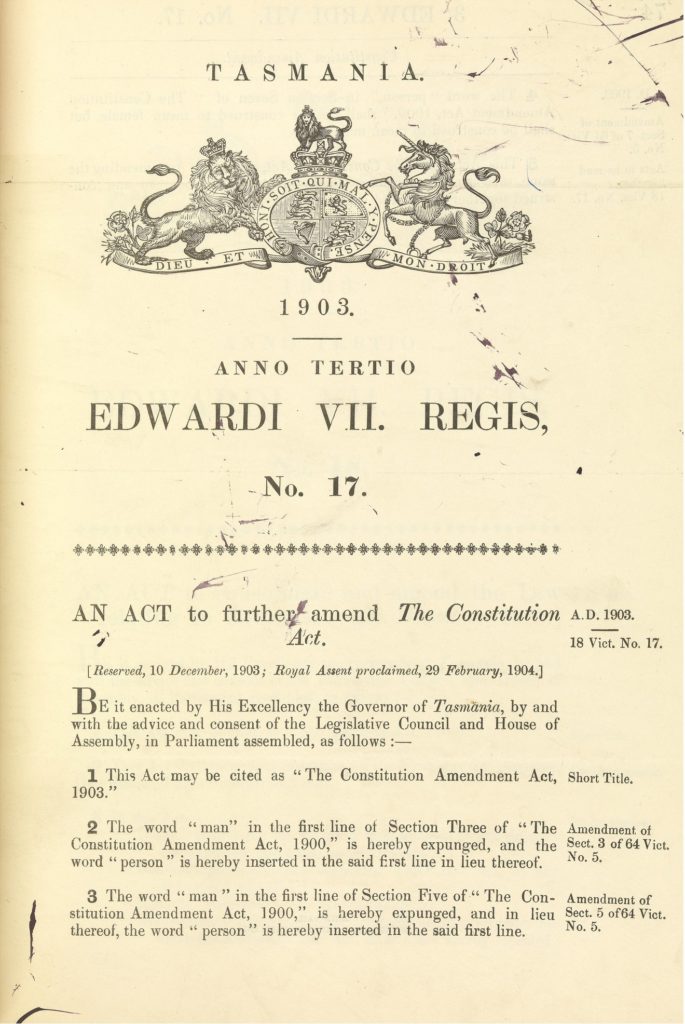
1903 Act of Parliament (Tasmanian Archive and Heritage Office). Link to Act.
CONSTITUTION BILL.
WOMEN’S FRANCHISE ACCEPTED.
FRANCHISE REDUCTION REJECTED.
FEMALE MEMBERS EXCLUDED.
Committee resumed on the bill to further amend the Constitution Act.
On clause 2-“Woman franchise” –
Hon. C E DAVIES said he had not dealt with that subject on the second leading, but he thought it would be better if the consideration of the matter was delayed for a short time. The Federal Constitution had given the vote to the women, and the coming federal elections would prove an excellent trial throughout Tasmania. No harm could be done by delaying the matter for a few months, for they could not bring the women vote into operation for some time, the placing of the names on the roll could not be accomplished without work and expense. He had said he was prepared to give lo women possessing the property qualification a vote for the Council.
Hon. A. MORRISBY said he could see no reason for delaying the matter Women suffrage had already been tried in South Australia and New Zealand, and no effort had been made in the States where it had been tried to deprive the women of their franchise He claimed that the franchise was a right, and that should no longer deprive women of that light. The federal rolls would be a great assistance in compiling the State rolls If there was a desire to make sure that women should not sit in Parliament, the required provision could easily be effected.
Hon. Sir ADYE DOUGLAS said not a single petition had been presented to Parliament by women asking for the vote. He did not believe that the women of Tasmania wanted the franchise, and he challenged any member to say that half a dozen women had asked him to give the franchise to women. He would vote against the clause
Hon. W. CROSBY said he beloved the women vote would help to remedy some of the evils in the political arena. He could see no objection to granting the vote to women and believing it would prove beneficial to the general politics of he State he would support the clause.
Hon. R. S. SCOTT in supporting the clause said he had received a circular letter from the president and secretary of the Women’s Christian Temperance Union claiming the franchise as a right. The women believed hat they could advance the causes of Christianity and morality by means of the ballot box and he was prepared to accede to their request.
Hon. H. A. NICHOLS supported the clause. He thought it was ridiculous to deny women the right to vote for the State Parliament, when they had the franchise for the higher Federal Parliament. The Council claimed to represent property; how then could they deny representation to property owned by women.
Hon. C. E. DAVIES said he also opposed the clause on the grounds of expense. He believed the Federal rolls for Tasmania would cost £1000. He would be prepared to give the vote for the Council to women owning the requisite property qualification.
Hon. E. DEAN supported the clause believing that the Council had nothing to fear from the proposed extension of the franchise. There was no sound political argument against the enfranchisement of women. His one objection was that the right of women to sit in Parliament was was not clearly expressed — care should be taken that it was distinctly stated that women should not sit in Parliament. If that provision was made he would gladly support the clause.
The Mercury, 9 October 1903
